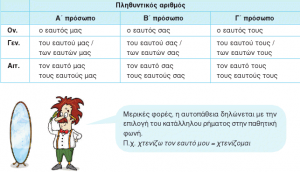Language/Modern-greek-1453/Grammar/Reflective-pronouns-Αυτοπαθείς-αντωνυμίες
After you've achieved a solid foundation in this subject, you might like to explore these additional areas: Verb To Be, The predicate, Adverbs and Adverbial Phrases & Imperative Mood in Greek.
Definition[edit | edit source]
Reflexive pronouns in Greek, as in other languages, are used when the subject and object of a verb are the same entity. In Modern Greek, the reflective pronoun is usually constructed by the word "εαυτός" (himself), which adjusts for gender, number and case, combined with the appropriate possessive pronoun.
Here are some examples:
Gen: Του εαυτού μου (tou eaftou mou) myself
Acc: Τον εαυτό μου (ton eafto mou) myself
Gen: Του εαυτού σου (tou eaftou sou) yourself
Acc: Τον εαυτό σου (ton eafto sou) yourself
Gen: Του εαυτού του (tou eaftou tou) himself, itself
Acc: Τον εαυτό του (ton eafto tou) himself, itself
Gen: Του εαυτού της (tou eaftou tis) herself
Acc: Τον εαυτό της (ton eafto tis) herself / herself
Eg :
- Δεν προσέχω τον εαυτό μου. (Den proseho ton eafto mou) I don’t look after myself.
- Η Σοφία θεωρεί τον εαυτό της υπεύθυνο για το ατύχημα. (i Sophia theori ton eafto tis ipefthino gia to atyhima) Sophia considers herself responsible for the accident .
- Η Άννα και ο Κώστας σκέφτονται πρώτα τα παιδιά τους και μετά τον εαυτό τους. (i Anna kai o Kostas skeftontai prota ta paidia tous kai meta ton eafto tous) Anna and Costas think of their children first and after of themsef.
These pronouns are used when the subject performs an action upon itself. For instance, "Ο Νίκος βλέπει τον εαυτό του στον καθρέφτη" means "Nikos sees himself in the mirror".
Please note that my explanation is a simplification, and the usage of reflexive pronouns in Greek can depend on various other factors.
Declension - Κλίση[edit | edit source]
These are the main reflexive pronouns in Greek. They refer back to the subject of the clause and are used when the subject and the object of the verb refer to the same person or thing. They are typically used in sentences where the subject acts upon itself, for example, "I hurt myself", "You see yourself", "They love themselves" and so on.
Ενικός αριθμός : Singular[edit | edit source]
| α' πρόσωπο (1st person) | β' πρόσωπο (2nd person) | γ' πρόσωπο (3rd person) | |
|---|---|---|---|
| Ον. (Nominative) | ο εαυτός μου (myself) | ο εαυτός σου (yourself) | ο εαυτός του/της (himself/herself) |
| Γεν. (Genitive) | του εαυτού μου (of myself) | του εαυτού σου (of yourself) | του εαυτού του/της (of himself/herself) |
| Αιτ. (Accusative) | τον εαυτό μου (myself) | τον εαυτό σου (yourself) | τον εαυτό του/της (himself/herself) |
- The nominative case is used for the subject of a sentence.
- The genitive case is often used to show possession.
- The accusative case is used for the direct object of a sentence.
Πληθυντικός αριθμός : Plural[edit | edit source]
| α' πρόσωπο (1st person) | β' πρόσωπο (2nd person) | γ' πρόσωπο (3rd person) | |
|---|---|---|---|
| Ον. (Nominative) | ο εαυτός μας (ourselves) | ο εαυτός σας (yourselves) | ο εαυτός τους (themselves) |
| Γεν. (Genitive) | των εαυτών μας (of ourselves) | των εαυτών σας (of yourselves) | των εαυτών τους (of themselves) |
| Αιτ. (Accusative) | τον εαυτό μας / τους εαυτούς μας (ourselves) | τον εαυτό σας / τους εαυτούς σας (yourselves) | τον εαυτό τους / τους εαυτούς τους (themselves) |
Author[edit source]
- Ευγενική χορηγία που στοχεύει να βοηθήσει μαθητές ή μη, απανταχού της Γης, που επιδίδονται στην εκμάθηση της ελληνικής γλώσσας!
- Contribution bénévole visant à aider les personnes, partout dans le monde, qui sont engagées dans l'apprentissage de la langue grecque !
- Voluntary contribution aimed at helping people, all over the world, who are committed to learning the Greek language!
Other Lessons[edit | edit source]
- The degrees of the adjective
- Basic spelling rules
- Verbs ending in «–ίζω»
- Future Tense
- Punctuation
- The comma
- Synonyms Antonyms
- Imperative (Present)
- Past Tense
- Pronunciation rules

